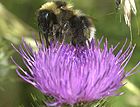Rare Bees Return to Warwickshire
A farm in Warwickshire has tempted back two species of bumble bee previously thought to be practically extinct inthe UK.


Lord Willoughby de Broke's Ditchford Farm in Warwickshire has recently become a popular haunt for two very rare species of bumble bee, Bombus Rudereatus and Bombus Harrisellus.
The Bombusgenus is unusual among British bumble bees because the bees are large, which means they need very flower rich landscapes. Over the last century, there has been a decline of 95% in their numbers, mainly because the plants and flowers they prefer had become scarce.
The Countryside Stewardship Scheme, run by Defra, aims to redress imbalances of this sort, and Lord Willoughby's farm has been one of the sites involved. Its fields have wide margins, which are planted with a variety of grass and wildflowers designed to be beneficial to all sorts of wildlife, and have roved irresistible to the bees.
Steven Falk, Senior Keeper of natural history at Warwickshire Museum said: 'When I first saw someRudereatusit was like seeing a ghost - the previous Warwickshire record was from the 1920s and I had assumed it was long extinct here.
'It has been the most delightful discovery to see these bees back, and I really hope we can secure their long-term future here.'
Read more countryside news here
Sign up for the Country Life Newsletter
Exquisite houses, the beauty of Nature, and how to get the most from your life, straight to your inbox.
-
 From California to Cornwall: How surfing became a cornerstone of Cornish culture
From California to Cornwall: How surfing became a cornerstone of Cornish cultureA new exhibition at Cornwall's National Maritime Museum celebrates a century of surf culture and reveals how the country became a global leader in surf innovation and conservation.
By Emma Lavelle Published
-
 Jaecoo 7 SHS: Can you really get a luxury SUV for £35,000?
Jaecoo 7 SHS: Can you really get a luxury SUV for £35,000?The Chinese automaker Jaecoo lands on UK shores with the 7. We take it for a spin around Scotland and the north of England to see if the hype is real.
By Charlie Thomas Published
